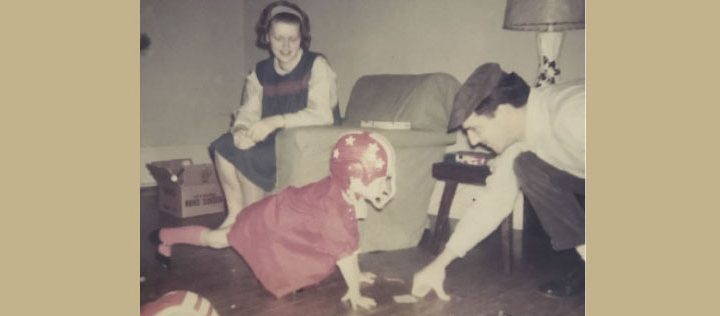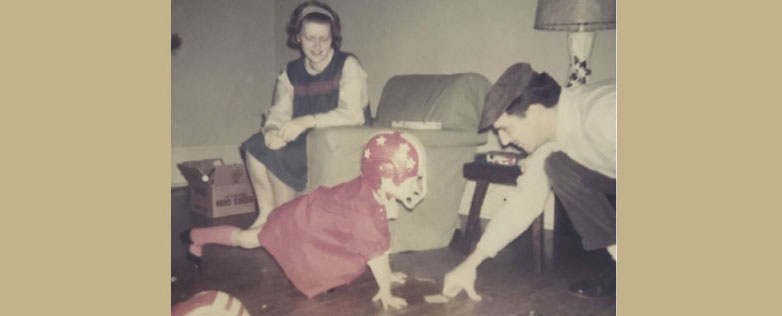This photo from 1964 tells you a lot about me. I had just turned 4 years old. You see how my mother has me dressed. We’re visiting my dad’s sister. My boy cousins had gotten football helmets for Christmas, and I much preferred those to my patent leather shoes and red dress with lace trim.
A couple of years later, I started first grade, and I probably became a feminist when they told me I couldn’t play football because I was a girl. I knew something was not right in the world if I couldn’t play football.
For as long as I can remember, I have loved the game of football. I grew up in Georgia, where football is as much a religion as Christianity, both often practiced by the same people at the same time.
“I grew up in Georgia, where football is as much a religion as Christianity, both often practiced by the same people at the same time.”
When high school rolled around, I was on the bleachers under the Friday night lights. On Saturdays, I watched college football, and on Sundays I watched the Falcons lose, again and again, year after year. And I haven’t yet stopped hoping. I have a Christmas ornament that says, “All I want for Christmas is the Falcons to win the Super Bowl.” Well, a woman can dream, right?
At Oregon State, I’ve been able to see big-time NCAA football up-close, and I’ve been a Beaver Believer for nearly 27 years now. Our head coach is a former student of mine, a good man and a good coach. He was our quarterback in the 2000 season when we went 11-1, rolled over Notre Dame in the Fiesta Bowl, and finished the season ranked No. 4 in the country.
This year we went 10-3, destroyed Florida in the Las Vegas Bowl, and ended the year ranked No. 17. Not bad for a program that still holds the record for the most losing seasons in a row at 28. And, yes, I experienced some of those years as well.
Football is a beautiful game. All the pieces of a long, completed pass — the pocket that holds, the break from the defender, the timing of the throw down field, the catch and control — are discipline and magic. Football is athleticism as its finest, strategies planned as if going to war. The game is exciting, an emotional ride. It’s rivalries, communities, mascots, jerseys and school colors. Every game is its own thrilling story of ups and downs, overcoming, winning and losing. And I love it all.
And yet, I’ve come to have a much more ambivalent relationship with football in the last decade or so.
There’s been a lot of handwringing about football in the last couple of weeks since Buffalo Bills safety Damar Hamlin experienced a cardiac arrest on the field during a game against Cincinnati and had to be resuscitated. It took the NFL an hour to decide to postpone the game and then days to cancel it altogether.
And now the playoffs move on as if we didn’t watch a young man nearly die in front of us because of a brutal hit he put on a Bengals wide receiver. Yes, he’s doing much better now, but he might not have been. And still, I’ll put on my Seahawks gear on Saturday and cheer on my second favorite team.
My ambivalence began much earlier than Hamlin’s cardiac arrest. But that scene magnified one of the first issues that gave me pause.
You’ve probably seen the photo of Hamlin’s teammates praying for him. Perhaps you’ve even nodded approvingly at it. My issue isn’t one of praying, but it’s one of the close associations of football and Christianity. Ruth Graham does a good job outlining those connections in a New York Times piece.
“When fathers left for work, they left their sons at home with their mothers, creating a fear that boys would become feminized.”
Historically, these associations are rooted in what’s known as “muscular Christianity.” In the late 1800s and early 1900s as people left the farms for the cities and manufacturing jobs, labor became more divided by gender, with men going off to work and women staying to work in the home. When fathers left for work, they left their sons at home with their mothers, creating a fear that boys would become feminized. This led to a moral panic that dominating mothers would make their sons gay. The answer to this problem was organized, competitive, team sport.
Sport became the way to shape boys into heterosexual, masculine men, as well as to maintain men’s power over women by elevating the male body as superior to the female body. Sport was the place where boys learned masculine behaviors and where masculine behaviors were reinforced.
At the same time, Christianity became concerned with ensuring boys’ heterosexuality and masculinity. Sports were a way to instill moral values through violent competition and to keep boys and men from immoral influence by hardening them. In this mix, we find the beginnings of the Young Men’s Christian Association. Sports provided a way to make boys and men better Christians, and that way was the way of traditional masculinity and heterosexuality.
And this tradition has continued. We’ve seen it in Promise Keepers. And we see it in the current attempts to create Jesus as a hyper-masculine man, the kind of guy you’d drink a beer with in a sports bar (if Baptists drank beer — or admitted they did).
“Football players are the guys’ guys, the guys many men aspire to be.”
The problem for me in all of this is that it means at its core, sport intertwined with Christianity (or perhaps it’s Christianity intertwined with sport) is about heterosexual male dominance, and football, as the pinnacle of masculinity, reinforces male dominance. Think, for example, of how often we hear some version of this in relation to women’s advancement: “Yeah, well, a woman will never play in the NFL.” Football players are the guys’ guys, the guys many men aspire to be, the men in whom many other men find a sense of their own masculinity over against that of mere girls who can never play football in the NFL.
All that manly Christian masculinity in football bothered me, but for a long time I saw it as no worse than the misogyny of pretty much every other social institution that excludes and demeans women.
The real test of my love for football came, however, when we started to hear more and more about sexual assaults and domestic violence incidences by football players that were, in essence, given a wink and a nod by the NFL and the NCAA. Remember Ray Rice, Ben Roethlisberger and James Winston? Then we have Deshaun Watson, who was accused by 30 women of assaulting them. The NFL suspended him in August for 11 games and fined him $5 million. Three and a half months later, he was back on the field.
All these assaults and the bumbling responses of the NFL and NCAA forced me to start asking some harder questions of football, like, is gender-based violence intrinsic to the sport? After all, a sport rooted in hypermasculinity, male dominance and violent competition may well be the perfect storm to produce and reinforce misogyny, homophobia and violence against feminized others (women, trans and non-binary people, children).
The final blow for me, if you’ll pardon the pun, is traumatic brain injury, both the likelihood of it for football players and the callous way the NFL approaches it. Earlier this season we saw Miami Dolphins quarterback Tua Tagovailoa’s head slammed to the ground. Just a few short weeks later, Tagovailoa was back in action. In December, he suffered another concussion.
We found out in 2021 the NFL was using race-norming to settle brain injuries for Black players — assuming Black players started out with lower cognitive functioning than white players — when the league announced it would end the practice.
“The NFL has a history of denying the link between playing football and CTE.”
Still, as the New York Times recently reported, the NFL isn’t doing enough to address concussions. The research shows that football players disproportionately experience Chronic Traumatic Encephalopathy. CTE is a degenerative brain disease linked to head injuries, and yet the NFL has a history of denying the link between playing football and CTE.
All this leaves me stuck in a love-hate relationship with football. I’ve thought about divorcing it entirely. I’ve certainly lost some of my enthusiasm for it. And I haven’t even talked about the money, the out-of-control salaries for star players, the salaries for public university coaches who are almost always the highest paid state employees — more than governors and state program directors and certainly more than university professors.
There are the badly behaving fans, the swearing drunk men spilling beer down your back (that’s why I stopped going to Seahawks games) and threatening violence against the other drunks who inadvertently bumped into them on their way to buy another beer. There’s the high school coach who disingenuously suggests he can pray at the 50-yard-line after games and not violate the separation of church and state or pressure players to join him (apparently, however, the Supreme Court agrees with him). There’s the endless parade of Tim Tebow wannabes parading across the stages of churches everywhere reinforcing messages about gender, male dominance and Christian faithfulness.
And there are all those little girls, still excluded from the main event, still made to feel less than because they can’t play football, still disadvantaged in the board room and in the pastor search committee.
“I still envy them the chance to play, even knowing everything I know.”
I also teach many of these college players, and I see the difference football has made for them. It has been the proverbial way out of poverty or violence or difficult situations. I see how they love the game, and I still envy them the chance to play, even knowing everything I know.
I’m not sure I can give up football. Perhaps I can continue to work to change the culture that valorizes violent competition through my teaching and writing. Or maybe that’s just a way to soothe my guilt over my hypocrisy.
Sarah Ahmed talks about the “feminist killjoy.” Yep, that’s me. Usually I enjoy that role, but it’s really hard over football because I love the game. Still, when you’re cheering on your favorite team over the weekend (or whatever team is playing your team’s mortal enemy), I hope you’re of two minds, even though that may ruin your pure joy in watching too.
We need to pay attention. We need to demand more of the NCAA, NFL and all the way down to our elementary teams. We need to demand more of ourselves as people who consume football and all its glorious merchandise (I have quite the collection of Beaver-wear).
Football is a moral question, just not the one muscular Christianity is asking.

Susan Shaw
Susan M. Shaw is professor of women, gender and sexuality studies at Oregon State University in Corvallis, Ore. She also is an ordained Baptist minister and holds master’s and doctoral degrees from Southern Baptist Theological Seminary. Her most recent book is Intersectional Theology: An Introductory Guide, co-authored with Grace Ji-Sun Kim.
Related articles:
Ready for some Friday night football and prayer? | Analysis by Harold Ivan Smith
God, bless this football game to our blood lust’s nourishment | Opinion by Brad Bull
When it comes to leading corporate prayer, are we really all in this together? | Opinion by Mark Wingfield
Choosing the underdog | Opinion by Patrick Wilson


